Posted by Roberta Grimes • February 24, 2024 • 12 Comments
The American Revolution, Thomas Jefferson
My country, ’tis of thee, sweet land of liberty, of thee I sing.
Land where my fathers died, land of the pilgrims’ pride,
From every mountainside, let freedom ring!
My native country, thee, land of the noble free, thy name I love!
I love thy rocks and rills, thy woods and templed hills,
My heart will rapture fills like that above!
Let music swell the breeze and ring from all the trees
Sweet freedom’s song.
Let mortal tongues awake, Let all that breathe partake,
Let rocks their silence break, the sound prolong!
– Samuel Francis Smith (1831-1895), from “My Country ‘Tis of Thee” (1831)
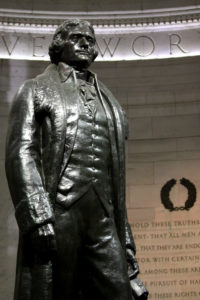 One of our great shared possessions as human beings is a few sheets of parchment which are housed in the Rotunda for the Charters of Freedom on the second floor of the National Archives Museum in Washington, D.C. Faded and barely readable now, those documents are the Declaration of Independence, the Constitution of the United States, and the Bill of Rights. And yes, I understand and I love the fact that our family of readers here is worldwide. But at this point, those documents belong to all of humanity. The five wise and far-seeing gentlemen who together led the process of designing the government of the United States of America cannot have known that they were creating what was going to become to date perhaps the most stable and beneficent and among the longest-lived governmental designs in all of human history. Four Virginians and one Bay Stater together created two hundred and thirty-eight years (and counting) of the same form of government of more than three hundred and thirty million people, all living together in one place.
One of our great shared possessions as human beings is a few sheets of parchment which are housed in the Rotunda for the Charters of Freedom on the second floor of the National Archives Museum in Washington, D.C. Faded and barely readable now, those documents are the Declaration of Independence, the Constitution of the United States, and the Bill of Rights. And yes, I understand and I love the fact that our family of readers here is worldwide. But at this point, those documents belong to all of humanity. The five wise and far-seeing gentlemen who together led the process of designing the government of the United States of America cannot have known that they were creating what was going to become to date perhaps the most stable and beneficent and among the longest-lived governmental designs in all of human history. Four Virginians and one Bay Stater together created two hundred and thirty-eight years (and counting) of the same form of government of more than three hundred and thirty million people, all living together in one place.
This ability of our style of government to be so stable and so resilient is essential! Human beings as individuals can own and can do nothing on our own, so having a stable government which protects fundamental human rights is the first and most essential element of civilization. Without it, we cannot even own our own lives.
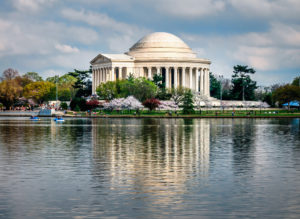 I apologize for this detour from our usual range of blog topics, but once in a while I come across what feels like a compelling reason to write about something else. And I am one of many Americans who have become alarmed to see how many of our next generation are taking for granted, and even are disparaging this incomparable gift that has been passed down to us by our forefathers. Those young folks’ problem is our failing public school system, which has ceased to teach our children as well as it has taught American generations past how very well our system of government works. And that is one danger that has been present from the beginning. As Benjamin Franklin was exiting the Constitutional Convention in 1787, a lady asked him what sort of government the attendees were designing. Franklin said, “A republic, madam. If you can keep it.”
I apologize for this detour from our usual range of blog topics, but once in a while I come across what feels like a compelling reason to write about something else. And I am one of many Americans who have become alarmed to see how many of our next generation are taking for granted, and even are disparaging this incomparable gift that has been passed down to us by our forefathers. Those young folks’ problem is our failing public school system, which has ceased to teach our children as well as it has taught American generations past how very well our system of government works. And that is one danger that has been present from the beginning. As Benjamin Franklin was exiting the Constitutional Convention in 1787, a lady asked him what sort of government the attendees were designing. Franklin said, “A republic, madam. If you can keep it.”
George Orwell, the author of the dystopian novel 1984, said, “The most effective way to destroy people is to deny and obliterate their own understanding of their history.” Which is why the recent attacks on America’s Founders and their work for some of the personal details of their lives, and most often because some of them were slaveholders at a time when slaveholding was seen as less reprehensible than it is today, is so troubling. These attempts to destroy our young people’s understanding and appreciation of the value of their American heritage are unforgivable. And they are motivated by the short-term self-interest of a malicious few.
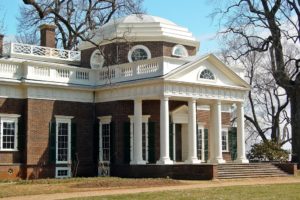 The usual enemies of this precious system have been those to whom its protection of the rights of even the least of us has been seen as a challenge to the aggrandizement of their own power. It was seen as extraordinary by many at the time of this nation’s founding that the five most prominent Founding Fathers, who then became this nation’s first five presidents and all of whom were wealthy aristocrats, were so eager to give their power over to the people. King George III of England once remarked that if George Washington gave up his power after the American Revolution, he would be truly the greatest man in the world. But Washington gladly gave up his power after two presidential terms, and he thus began a tradition of no more than two terms for any American president. That tradition, after Franklin D. Roosevelt attempted a third term, was eventually enshrined into law.
The usual enemies of this precious system have been those to whom its protection of the rights of even the least of us has been seen as a challenge to the aggrandizement of their own power. It was seen as extraordinary by many at the time of this nation’s founding that the five most prominent Founding Fathers, who then became this nation’s first five presidents and all of whom were wealthy aristocrats, were so eager to give their power over to the people. King George III of England once remarked that if George Washington gave up his power after the American Revolution, he would be truly the greatest man in the world. But Washington gladly gave up his power after two presidential terms, and he thus began a tradition of no more than two terms for any American president. That tradition, after Franklin D. Roosevelt attempted a third term, was eventually enshrined into law.
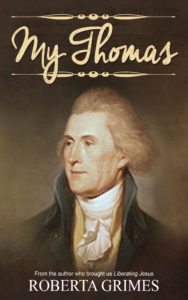 I came to see and to understand the devotion that one of our Founding Fathers felt to the welfare of the common man. When my Thomas wanted to prove to Jesus that I was very well able to channel so I would for sure be able to channel Liberating Jesus for Him, Thomas led me in the late eighties (and long before I knew him as my spirit guide) to research and then to channel his own autobiography of Thomas Jefferson’s ten-year marriage, which spanned the American Revolutionary War. I knew nothing about Thomas’s motive in doing this at the time. I thought the book was just an historical novel, and I assumed that writing it was my own idea. But Thomas led me to do a great deal of historical research, and I came to know the American Revolutionary period, and especially the young Thomas Jefferson, pretty well. And when I say that he was young, I do mean that he was very young! The author of the Declaration of Independence was just thirty-three years old when he wrote what are this nation’s founding words. Here is how the Declaration of Independence begins:
I came to see and to understand the devotion that one of our Founding Fathers felt to the welfare of the common man. When my Thomas wanted to prove to Jesus that I was very well able to channel so I would for sure be able to channel Liberating Jesus for Him, Thomas led me in the late eighties (and long before I knew him as my spirit guide) to research and then to channel his own autobiography of Thomas Jefferson’s ten-year marriage, which spanned the American Revolutionary War. I knew nothing about Thomas’s motive in doing this at the time. I thought the book was just an historical novel, and I assumed that writing it was my own idea. But Thomas led me to do a great deal of historical research, and I came to know the American Revolutionary period, and especially the young Thomas Jefferson, pretty well. And when I say that he was young, I do mean that he was very young! The author of the Declaration of Independence was just thirty-three years old when he wrote what are this nation’s founding words. Here is how the Declaration of Independence begins:
In Congress, July 4, 1776
The unanimous Declaration of the thirteen united States of America, When in the Course of human events, it becomes necessary for one people to dissolve the political bands which have connected them with another, and to assume among the powers of the earth, the separate and equal station to which the Laws of Nature and of Nature’s God entitle them, a decent respect to the opinions of mankind requires that they should declare the causes which impel them to the separation.
We hold these truths to be self-evident, that all men are created equal, that they are endowed by their Creator with certain unalienable Rights, that among these are Life, Liberty and the pursuit of Happiness.–That to secure these rights, Governments are instituted among Men, deriving their just powers from the consent of the governed, –That whenever any Form of Government becomes destructive of these ends, it is the Right of the People to alter or to abolish it, and to institute new Government, laying its foundation on such principles and organizing its powers in such form, as to them shall seem most likely to effect their Safety and Happiness.
Thomas Jefferson was the youngest member of the Congress in 1776. That he was entrusted with the task of writing such an important document shows the esteem in which both he and his writing skills were held by his fellow Virginians. And whenever I mention the Declaration of Independence, I feel the need to point out two things:
That generation of giants, as they often are called, were truly moral marvels. What was especially amazing to me when I was doing my research was that Thomas Jefferson, this highly educated young aristocrat, was so determined to take down his own class, and to elevate the farmers and shopkeepers and the poor. You had to love the guy! Some of his youthful writings survive, where he talks about how the time has come, and how important it is that the working class rise and rule itself. Karl Marx could not have said it better. Although, unlike Marx, Jefferson truly meant it.
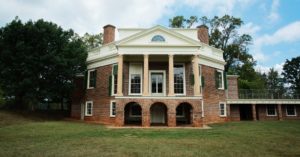 Thomas Jefferson lived his childhood and youth on the edge of the great and still largely unexplored continental forest. He was confident that all that new, wild land and the yeomen who were going to fill it were the future. He loved Monticello, his mountain farm, and as the Revolutionary War moved toward its favorable conclusion, he began to make plans for his future life at Monticello with Martha, the woman he called Patty, the love of his life whom he had married as the war was beginning. But tragically, the life that Jefferson was planning with Patty was not to be, because she died of complications of diabetes in the late summer of 1782.
Thomas Jefferson lived his childhood and youth on the edge of the great and still largely unexplored continental forest. He was confident that all that new, wild land and the yeomen who were going to fill it were the future. He loved Monticello, his mountain farm, and as the Revolutionary War moved toward its favorable conclusion, he began to make plans for his future life at Monticello with Martha, the woman he called Patty, the love of his life whom he had married as the war was beginning. But tragically, the life that Jefferson was planning with Patty was not to be, because she died of complications of diabetes in the late summer of 1782.
 I don’t think that I much overstate the situation when I say that Patty’s death was the most pivotal event in American history between the America Revolution and the beginning of the twentieth century. Jefferson burned all his wife’s letters and papers after her death, which made writing My Thomas, my memoir/novel about their marriage and the Revolution more difficult. But it is easy to see just from the circumstances of her life and from Jefferson’s writings both before and after her death that she was an ardent abolitionist. Her father had been an importer of slaves, and she had a much-beloved slave stepmother and six deeply beloved slave half-siblings, all of whom were members of Thomas Jefferson’s household. While she was alive, her husband’s thoughts were ardently bent toward abolition.
I don’t think that I much overstate the situation when I say that Patty’s death was the most pivotal event in American history between the America Revolution and the beginning of the twentieth century. Jefferson burned all his wife’s letters and papers after her death, which made writing My Thomas, my memoir/novel about their marriage and the Revolution more difficult. But it is easy to see just from the circumstances of her life and from Jefferson’s writings both before and after her death that she was an ardent abolitionist. Her father had been an importer of slaves, and she had a much-beloved slave stepmother and six deeply beloved slave half-siblings, all of whom were members of Thomas Jefferson’s household. While she was alive, her husband’s thoughts were ardently bent toward abolition.
In fact, thanks to Jefferson, Virginia was the first jurisdiction on earth to ban the importation of slaves. And as the war ended, so also did his life on the national stage. He gladly headed home to Monticello to spend the rest of his life as a gentleman farmer who had one remaining public task firmly in mind. With his wife by his side, he planned to end forever the curse of slavery in America. But first, he had to determine the best way to do it, so his mind at the time was full of what he thought of as his great experiment. He was worried that a general emancipation might have adverse implications for the slaves if they simply were freed into the much stronger and more numerous white population, since he had seen and been appalled by the miserable conditions of the freedmen in the northern cities. So he was planning to experiment first on his own farm as to the best way to effect his planned emancipation. Might doing it with a checkerboard of farms be best? But he was determined to work this out, and to make a universal American emancipation before the end of his life his one great cause. So if Patty had lived a normal lifespan, there likely would have been an American abolition and a full emancipation in the first part of the Nineteenth Century, and therefore there never would have been an American Civil War.
Instead, of course, Thomas Jefferson soon lost the love of his life, and with her he lost his abolitionist motor. He could no longer stand the sight of Monticello, so he abandoned his beloved home for decades. He sailed at once for France to assist in negotiating the peace, and he then became America’s first Secretary of State, its second Vice President, and the third President of the United States. Thomas Jefferson never married again, nor does it seem that he ever even had a lady friend; but instead, he mourned Patty for the rest of his life. Even in his old age, he still referred to his long-ago marriage as “ten years of unchequered happiness.” Now, his ten years of marriage spanned the Revolutionary War. So you know that has to have been some marriage!
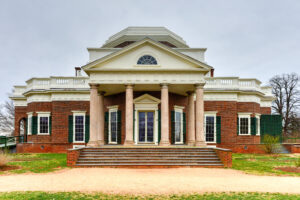 Everyone wants Thomas Jefferson’s honest answer to the Sally Hemings question. And when eventually I asked my Thomas about it, rather than answering that question himself, he arranged for me to meet personally with the former president in the astral plane. I had already long since done the research and determined, based upon a lot of evidence, that Thomas Jefferson’s younger brother, Randolph, was the probable father of Sally Hemings’s children who had inherited Jefferson DNA (Sally also had a half-dozen children by other fathers). But meeting with my Thomas and also his Thomas Jefferson incarnation, both at the same time, was fascinating! In the astral plane you can feel people’s spiritual vibrations, and their vibrations are very similar but Thomas does vibrate higher. He urged me to ask the venerable president my question, but of course I was shy about doing that so frankly. When I did ask him the question, though, Thomas Jefferson said with the most wonderful soft Virginia accent, “I could not have been intimate with Sally Hemings because she was my property so she could not have consented.” Spoken like a gentleman.
Everyone wants Thomas Jefferson’s honest answer to the Sally Hemings question. And when eventually I asked my Thomas about it, rather than answering that question himself, he arranged for me to meet personally with the former president in the astral plane. I had already long since done the research and determined, based upon a lot of evidence, that Thomas Jefferson’s younger brother, Randolph, was the probable father of Sally Hemings’s children who had inherited Jefferson DNA (Sally also had a half-dozen children by other fathers). But meeting with my Thomas and also his Thomas Jefferson incarnation, both at the same time, was fascinating! In the astral plane you can feel people’s spiritual vibrations, and their vibrations are very similar but Thomas does vibrate higher. He urged me to ask the venerable president my question, but of course I was shy about doing that so frankly. When I did ask him the question, though, Thomas Jefferson said with the most wonderful soft Virginia accent, “I could not have been intimate with Sally Hemings because she was my property so she could not have consented.” Spoken like a gentleman.
 A friend and political ally of Thomas Jefferson asked the retired president to give some advice to his young son, Thomas Jefferson Smith, who had been named after Jefferson. A little more than a year before Jefferson died, he composed a letter to be given to the boy when he was old enough to appreciate it. Jefferson enclosed some practical advice, such as “Pride costs us more than hunger, thirst and cold,” and “When angry, count ten before you speak. If very angry, a hundred.” But the most moving part is the letter itself, which consists of the following “few words”:
A friend and political ally of Thomas Jefferson asked the retired president to give some advice to his young son, Thomas Jefferson Smith, who had been named after Jefferson. A little more than a year before Jefferson died, he composed a letter to be given to the boy when he was old enough to appreciate it. Jefferson enclosed some practical advice, such as “Pride costs us more than hunger, thirst and cold,” and “When angry, count ten before you speak. If very angry, a hundred.” But the most moving part is the letter itself, which consists of the following “few words”:
Monticello, February 21, 1825
This letter will, to you, be as one from the dead. The writer will be in the grave before you can weigh its counsels. Your affectionate and excellent father has requested that I would address to you something which might possibly have a favorable influence on the course of life you have to run, and I too, as a namesake, feel an interest in that course. Few words will be necessary, with good dispositions on your part. Adore God. Reverence and cherish your parents. Love your neighbor as yourself, and your country more than yourself. Be just. Be true. Murmur not at the ways of Providence. So shall the life into which you have entered, be the portal to one of eternal and ineffable bliss. And if to the dead it is permitted to care for the things of this world, every action of your life will be under my regard. Farewell.
Our Father God to Thee, Author of liberty, To Thee I sing.
My country ’tis of Thee, sweet land of liberty,
For all eternity, let freedom ring! Let freedom ring!
Samuel Francis Smith (1831-1895), from “My Country ‘Tis of Thee” (1831)
Too bad Marianne Williamson isn’t doing well and had to suspend her campaign; she has the right love-based ideas! I pray she will make it in the near future!
Ah yes, my dear Adrian, but she has truly awful executive skills, unfortunately. You do have to have those as well for the office of President!
Dear Roberta, Thank you for these historical insights. Our Constitution is such a small document compared to the many words ordinarilly used by common legislation. But it is a powerful, logical elaboration of The Declaration of Independence. In my aged years now, and with the benefit of my legal education at the Antonin Scalia School of Law, I believe it must have benefited from devine inspiration.
Oh my goodness, my dear precious Jack, are you saying that you have a law degree as well?? You truly do never cease to amaze me!! And yes, those documents were indeed divinely inspired. It was my Thomas’s plan for that lifetime to contribute in a major way to the founding of this nation’s government and to help to set it on a sound course, which he certainly did do; but then he had planned to spend the balance of his life eradicating slavery from this continent, but Patty’s death sadly foiled that ambition.
What an astounding revelation and beautiful tribute you have given me about our American hero, Roberta! Thank you for giving us your time and knowledge and inspiration and for your very special talent of expression in a way that feels as if I am having a peek at your diary of your most intimate thoughts. Also, your visit with Thomas Jefferson while with your own guide Thomas, gives credence in my mind to the idea that there is no re-incarnation per se–that you met an aspect of Thomas’ soul family. In that case, Thomas Jefferson lives happily ever after with his beloved “Patty.” Can you speak to this?
My dear Janelle, I found that fascinating as well! No, reincarnation is not rapid and automatic. My Thomas took one lifetime after his Jefferson lifetime, almost immediately, because he was disappointed about aspects of that life – he summed it up by saying, “I had too much power and I did not always use it well,” so he thought he needed a life as a simple farmer in Wales to put himself back into balance. He then became a spirit guide, and reportedly I am his first venture into this occupation. So his Jefferson persona has been in the astral plane ever since he died from iit on 7/4/1826.
What fascinated me was to see how similar they were, and yet how different they were! Their personal energies are quite similar, but Jefferson’s are a bit softer, and in general he is a bit softer as an individual, I think. Thomas is a more intense version of what is essentially the same person. Just fascinating!
It is difficult to trust the authenticity of history as we learned it. We are witnessing how easily it can be changed.
Google’s new Artificial Intelligence has been making waves for it’s historical image generation. People asked it to generate images of the founding fathers and they came back as black men. Images of Vikings were also created as black men. It would not generate an image of a white person no matter what people asked of it.
So we may be witnessing a new history being created.
People achieve power and money from division. The way they portray Thomas Jefferson helps them maintain power. These ideologies then become a new religion. I think part of why people gravitate to these ideologies is wanting to belong to a group of people. It is also a way to virtue signal that you are a good person.
Most don’t even realize what is happening around them as they are more focused on their daily routines.
Which makes me wonder how Jesus was able snap people out of their realities when he was here? No doubt part of that was his natural charm. From what I’ve read, he also performed miracles. Did the miracles help shock people out of their daily “reality” and be open to other possibilities.
Sort of like when life gets more and more difficult. People starts noticing things they were previously oblivious too. Simply because it didn’t affect their lives up until that point.
I don’t know if I would have found the truth had it not been for my grandfather appearing to me while I was sleeping to say goodbye. Later that day I found out he passed away. That changed my reality.
“But meeting with my Thomas and also his Thomas Jefferson incarnation, both at the same time, was fascinating!”
What a magical place, to be able to manifest your own incarnations. I’m assuming that is what happened. Blows my mind away.
My dear Thomas, it is pretty clear that Jesus when He was on earth had tremendous personal charisma, and He was a mesmerizing speaker. And yes, He could perform miracles when the conditions were right. Very soon He had hundreds of people following Him, and sometimes even thousands, wherever He went. It is that truly wonderful Jesus, whose words are still preserved in the Biblical Gospels but really never taught by the churches, that we are teaching in our Wednesday classes!
Dearest Roberta,
So many things come to mind about this unique and fascinating blog post. However one thing will suffice here, I think.
The pursuit of happiness:
It struck me that to enshrine the search for happiness front and centre in the American Constitution is not only a Divine idea, it is ingenious in its shift of perception concerning both the value and the essential nature of human beings.
The Pursuit of Happiness is right up there with Life and Liberty. Life is, of course, the basic right of continuance on earth that no person has the authority to take from anyone else. Liberty is as necessary as life because it is akin to the very breath we need to keep living. Freedom being so inalienable, that an upright human life cannot be fully lived without it. It is a deep driving need within.
And the search for happiness is placed alongside these two principles in the Constitution! Amazing in its time because no other constitution on earth had ever included happiness. (I’m not sure if another constitution has included it since..)
It is almost as if the ‘result’ of being alive is to demand liberty as a given human need. Then one will naturally and necessarily try to find happiness. It’s in our human makeup, as it were. This could be seen as the blueprint of our psyche.
But happiness enshrined thus, does more than describe us as people. It takes the Constitution to a place where it regards the everyday struggle of an individual as being important. It emphasizes recognition of the value of the individual at core. Each person’s search for happiness matters! The Republic must protect each person and their struggle to be happy.
It is a new way of seeing. This constitution is not about fealty to the aristocracy or loyalty to the hereditary head of state. It is not about domination or the glory of empire. It’s not about blood and soil. Instead the focus remains at grass root level; it simply describes the right of each person to flourish.
A constitution is not only informed by the ideas and conditions of the people involved in its formation. It informs the perspective, the culture, thereafter.
When we think of immigrants who arrive and are different in many ways, we understand that they only want happiness and a good life for their children, just as we do. This attitude promotes acceptance. The incomers are humanized and eventually become ‘part of us’ and no longer occupy the ‘dark other’ archetype in our minds.. Mistrust is replaced by easy tolerance and finally by acceptance. (NB: A nation does need to adjust conditions to be favorable though, like establishing strong boarders, legally watertight visas et al.)
Knowing that people need to be able to find happiness links us with them, because each of us wants to be happy. So if a person is suffering we feel empathy; we feel the need to remove suffering any way we can. We are distressed by the pain of our fellows and we can then do amazing things to alleviate woe. Roberta, I am reminded of all the volunteers, fundraisers, doctors, nurses, the food and disaster relief organizations that help survivors of an earthquake, hurricane or wild fire.
Forgive me rabbiting on my dear. It’s just that I think ‘the pursuit of happiness’ in the Constitution permeates the culture and grows empathy. Empathy awakens the Divine sense of compassion within us – and then we can undertake amazing acts of selfless service because we are moved by inner compassion to help bring back happy lives to those who have been devastated.
Vitality and creativity abounds within a free nation that teaches people to follow their dreams. The USA is very fortunate indeed to have such wise and far seeing founding fathers.
❣️🕊🙏🏼
All of this is so wonderfully and beautifully said, my darling Efrem! You do make one small mistake in understanding, but that mistake is easily made by someone not an American. That proclamation of our God-given right to “life, liberty, and the pursuit of happiness” is not quite in our Constitution, but rather it is in our Declaration of Independence, the document that representatives of thirteen colonies on this continent signed in 1776, thereby beginning the American Revolution against Britain. I don’t think they could have understood at the time just how precious that document was going to become to every later generation of Americans, and primarily because of its enumeration of those sacred God-given rights! The Founders established with it a basis for American government so sacred that the Declaration of Independence is now seen to be without question a document with the force of law in this country. Not legislative law, but moral law to such an extent that it is now given equal reverence with the American Constitution and the Bill of Rights which followed it.
And of course, its primary author is our precious friend, our dear Thomas in his next-to-last incarnation. Turning the right to property into the right to pursue happiness was his own inspiration (he didn’t want me to bring this up again, but I love him and I am so proud of him!).
Dear Roberta. As a longtime adherent of reincarnation, I never much cared about the genealogy of the family I chose to be born into. Several months ago I delved into it and found that one forefather was involved in the Revolutionary War, another was in Jamestown and a young lady came over on the Mayflower! Notwithstanding the vast number of indigenous people who suffered from our forebears arrival, I do think they were divinely inspired in forming our founding principles.
Oh my dear Ray, how delightful it is to learn that you can trace your earthly ancestry here back to long before this nation’s founding! I cannot, of course. My present incarnation is 100% Danish, and I am a Viking to the core 🙂 . But l feel as you do, and I don’t care about this current body’s ancestry in any event.
As for fretting about the indigenous people who were displaced, of course that is a tale as old as human history. Their ancestors also conquered and displaced others who had held and hunted the land before them, so it isn’t their displacement in those early years that bothers me. I am, however disturbed by the way that some of our later presidents – looking at you, Andrew Jackson – treated the process of their removal as this nation expanded westward. There was and still is room on this continent for all of us to live together peacefully!